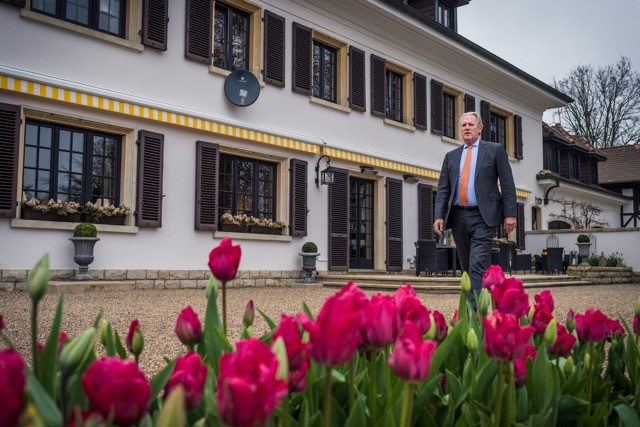8 out of 10 Dutch people own a bicycle. Dutch ambassador to Luxembourg Han-Maurits Schaapveld owns 5, the latest being an electric bike which he bought after moving to Luxembourg. “I always have to get onto the Kirchberg to get home. It convinced me to try an electric bike,” he tells me during our interview on 5 April.
Soft mobility is a priority for the Dutch and it is growing in importance for Luxembourg, whose capital and motorways are regularly gridlocked by traffic.
The ambassador, who arrived in Luxembourg in August 2017 after an interim posting in Beirut, would like to have addressed mobility sooner but his priorities were placed on hold as, within 7 months of taking up post, the King and Queen of the Netherlands came calling.
“We say, ‘would you rather have a state visit after you know the country and its people, or do you use the state visit to get to know the country and people?’,” he says. Schaapveld took it all in his large stride (he jokingly refers to himself as the “tall ambassador of small countries”). The visit in May 2018 was a great success, ending in a striking reception at the Philharmonie, whose auditorium was decked out in a stunning canopy of flowers.
Since then, Schaapveld and the embassy team have been following up not only on bilateral talks but also from the circular economy economic mission, which formed part of the state visit.

The ambassador arrived in Luxembourg in August 2017 after an interim posting in Beirut. Photo: Mike Zenari
Luxembourg has been working on developing circular economy measures since the Rifkin report was published in 2016. It is still very much in the early stages, however.
“Nobody is advanced enough on circular economy,” Schaapveld says, adding that the Netherlands is still trying out solutions they’d like to share with Luxembourg. Among the more successful he cites the plastic packaging for holding 6-pack drinks cans together, made from the waste byproduct of beer production.
In Luxembourg, he sees a key area for circular economy development in the construction from its steel activities. “Because you melt it down and start over again,” he says. “These are ideas we’re taking back. We’re looking at Dutch companies that can start collaborating here.”
Back on the subject of mobility, the ambassador has been sharing ideas with the tourism minister on biking and museum combination tickets. He is also a big supporter of the “bed and bike” accommodation network though he’d like to see more work done on cycle paths to make them circular.
On 4-wheels mobility, the Dutch embassy is leading by example: installing an electric vehicle charging station at the residence, for use by the Dutch environment minister when she visits for EU meetings. “We’re looking into the next official car, which will be electric,” the ambassador explains.
And at the end of spring, the embassy is planning an orange mobility day, putting Dutch e-mobility companies in contact with the Luxembourg companies and municipalities. This focus dovetails nicely with the Luxembourg government policy to transition to alternative fuels through new vehicle subsidies and the installation of charging infrastructure.
As ambassador, part of Schaapveld’s role is to forge partnerships between the two countries and report back on the possibilities in Luxembourg. He says the two already have a special relationship, thanks to their history, but also the fact many Dutch politicians and decision-makers holidayed in Luxembourg as youngsters.
“It’s a nice introduction. Obviously, Luxembourg has developed a lot since then.” It is, however, a new country for Schaapveld who, as the son of an ambassador, lived in Tehran, New York, Copenhagen, Rio de Janeiro and London before settling back in the Netherlands.

The ambassador believes 90% of Dutch firms are prepared for Britain's departure from the EU. Photo: Mike Zenari
But Luxembourg and the Netherlands are not so different--particularly when it comes to the expected Brexit impact. On the one hand, the two have attracted numerous firms in the Brexit fallout (42 to Netherlands and 47 to Luxembourg, at the time of publishing).
On the other, they are vulnerable. Both were named along with Ireland by global ratings agency S&P as the most susceptible to Brexit trade and migratory aftershocks. “We’re both going to lose a number of percentage points’ growth as far as the studies go,” he says.
Over a year ago, the Netherlands launched a Brexit scan service for companies to understand how it will impact them. More recently, it introduced the Brexit monster, a blue hand puppet used in campaigns. “I think 90% of companies are prepared,” the ambassador says.
Unlike Luxembourg, the impact on the Netherlands will be more physical, given trade into, out of and through the country. “There are new tariffs which means it is going to diminish.”
What will likely increase, at least in the early stages, is the tailbacks as firms grapple with new customs arrangements. Schaapveld says the country is working on allocating car parks for lorries to wait for customs clearance before embarking and after landing. It will be a glaring reminder of what EU membership brings to a country.
Looking to celebrate the Dutch King's day on 26 April? Each year the Dutch Club of Luxembourg hosts a public party at The Tube, 8 rue Sigefroi, Luxembourg-Centre, from 8pm.
